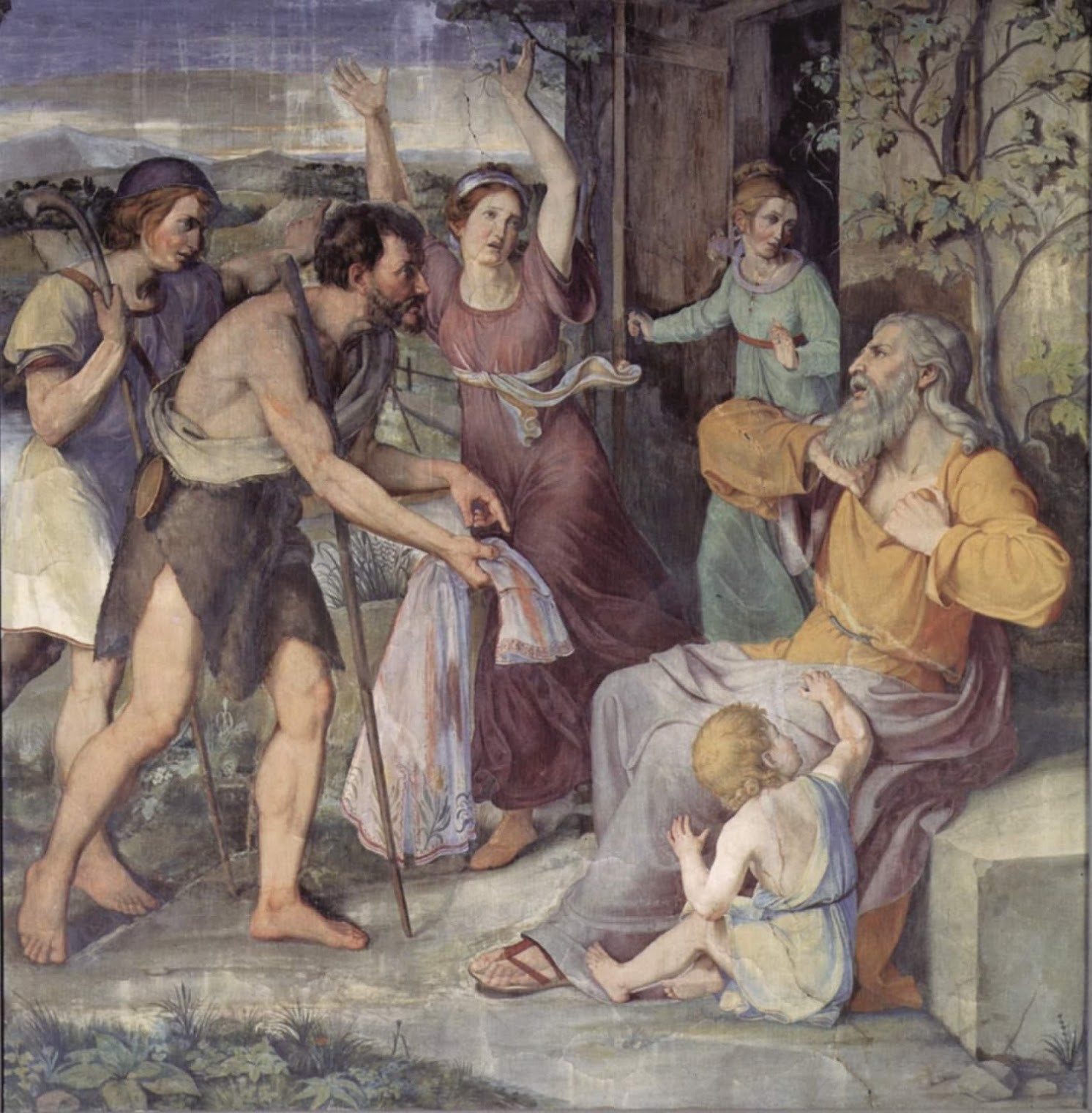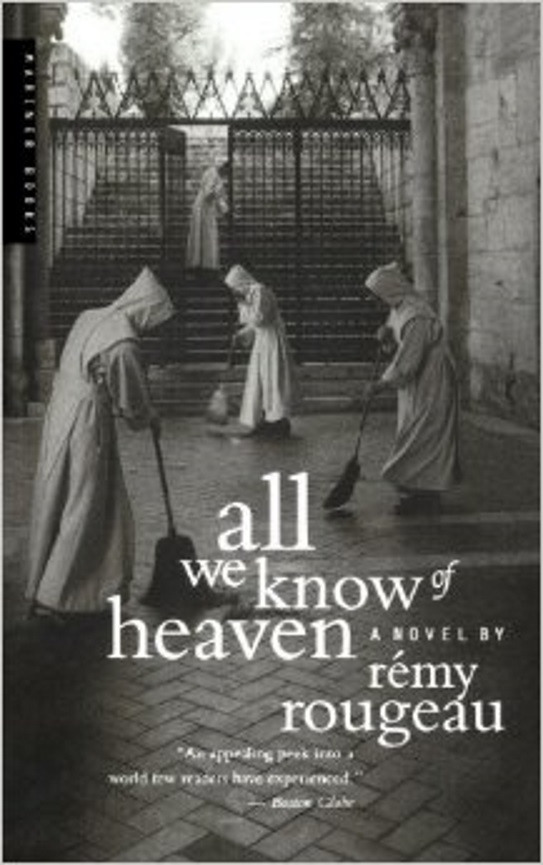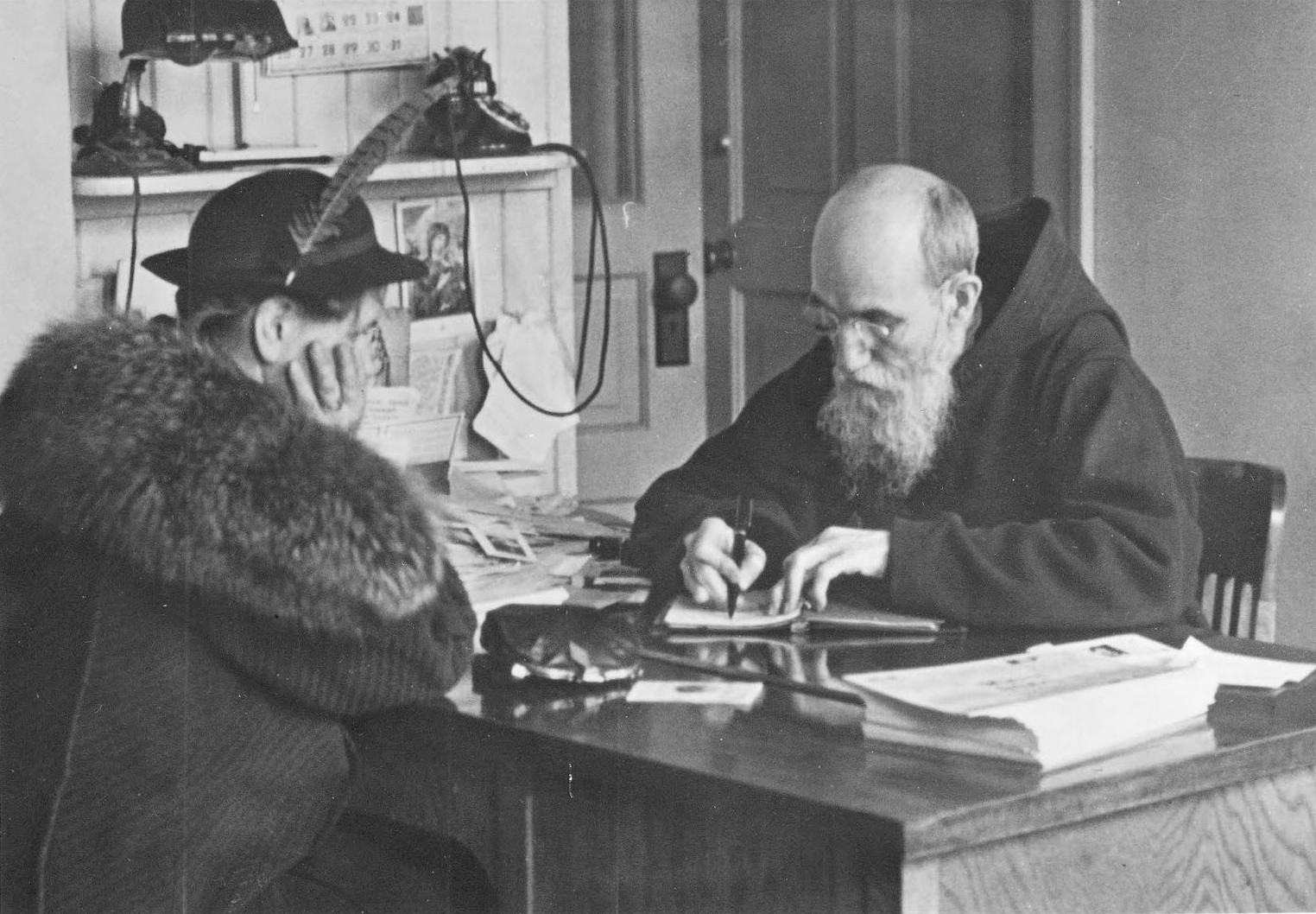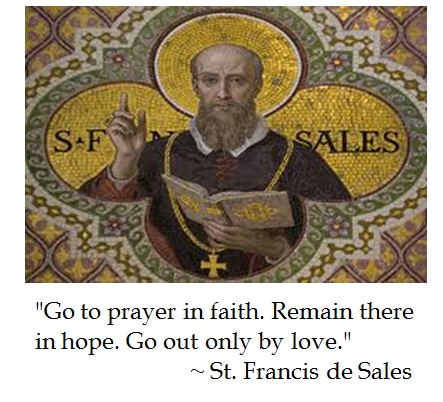
Jacob rending his garment at the news of Joseph’s demise, a portion of Joseph’s multicolored coat presented as proof.
After the death of Saul, when David had returned from the slaughter of the Amal’ekites, David remained two days in Ziklag; and on the third day, behold, a man came from Saul’s camp, with his clothes rent and earth upon his head. And when he came to David, he fell to the ground and did obeisance. David said to him, “Where do you come from?” And he said to him, “I have escaped from the camp of Israel.” And David said to him, “How did it go? Tell me.” And he answered, “The people have fled from the battle, and many of the people also have fallen and are dead; and Saul and his son Jonathan are also dead.” Then David said to the young man who told him, “How do you know that Saul and his son Jonathan are dead?” And the young man who told him said, “By chance I happened to be on Mount Gilbo’a; and there was Saul leaning upon his spear; and lo, the chariots and the horsemen were close upon him. And when he looked behind him, he saw me, and called to me. And I answered, ‘Here I am.’ And he said to me, ‘Who are you?’ I answered him, ‘I am an Amal’ekite.’ And he said to me, ‘Stand beside me and slay me; for anguish has seized me, and yet my life still lingers.’ So I stood beside him, and slew him, because I was sure that he could not live after he had fallen; and I took the crown which was on his head and the armlet which was on his arm, and I have brought them here to my lord.” Then David took hold of his clothes, and rent them; and so did all the men who were with him; and they mourned and wept and fasted until evening for Saul and for Jonathan his son and for the people of the LORD and for the house of Israel, because they had fallen by the sword. And David said to the young man who told him, “Where do you come from?” And he answered, “I am the son of a sojourner, an Amal’ekite.” David said to him, “How is it you were not afraid to put forth your hand to destroy the LORD’S anointed?” Then David called one of the young men and said, “Go, fall upon him.” And he smote him so that he died. And David said to him, “Your blood be upon your head; for your own mouth has testified against you, saying, ‘I have slain the LORD’S anointed.'” –2 Samuel 1
“I adjure you by the living God, tell us if you are the Christ, the Son of God.” Jesus said to him, “You have said so. But I tell you, hereafter you will see the Son of man seated at the right hand of Power, and coming on the clouds of heaven.” Then the high priest tore his robes, and said, “He has uttered blasphemy. Why do we still need witnesses? You have now heard his blasphemy. What is your judgment?” They answered, “He deserves death.” –Matthew 26
As I was walking this morning the Biblical concept of rending garments played through my mind. I toss out scripture, allowing the word of God to work for itself. Pretending, portending nothing. The idea of extreme sorrow, a severe affront to truth, an ending, death, demanding the shredding of one’s clothing, stripping the body of what once brought warmth and shelter. It is a natural reaction I experience, mentally playing out the act in times of harsh consternation. Maybe it is instilled through teachings, yet when something is a horrible affront, I feel the need to rip my shirt from my chest. That which use to clothe is no longer appropriate. I must strip myself naked before God because the deepest truths, those things that mean everything to me, have been altered. I can no longer live the way I once did. Everything has changed. I stand exposed before God, pleading for assistance. During meditation before the Eucharist there are times, I will involuntarily and violently wrench my head, matters internally being ripped asunder, a tearing away at myself, cutting loose obstacles. I must be careful, weary of myself, allowing God to perform the extractions. Rebellion for the sake of rebelling is an affront. Typically rebellion is a knee jerk reaction arising from pride and stubbornness. Within purposeful rebellion, obedience must exist. It is a serious, grave, act to rend one’s garments. The last example witnesses the High Priest conducting the act in rejection of Christ, demonstrating the destructiveness such a serious act can declare within faulty discernment. In the face of truth, being alive, we cloth ourselves, sheltering our existence, moving forward in convictions. Rending our garments, rebelling in the face of Christ for the sake of establishing identity, can be conducted in a multitude of ways. Rebellion against spiritual growth, the rejecting of truth, is the negative aspect of the rending of garments. On the positive side, I am convinced, the rending of garments demonstrates growth. Maturing psychologically and spiritually, there are times we need to rend our garments, rip clean from our bodies that which use to clothe us, to mature and grow up. In the light of truth, under the protection of Mary, the saints abiding, the Church providing, Christ sanctifying: we must not fear, able to pass through and ascend while stripped bare; raw, sensitive, and vulnerable–understanding God will provide new clothes. The rending of one’s garment properly done is the shedding of an old skin, the tearing away from that which we have outgrown, advancing in the sunshine of the Holy Spirit. We must not fear detaching ourselves from that which no longer carries us toward Christ. May we aspire to one day be attired like Joseph of the Old Testament, to be so bold as to clothe ourselves in a multicolored brilliant coat of majesty provided by Our Lord.
“Therefore I tell you, do not be anxious about your life, what you shall eat or what you shall drink, nor about your body, what you shall put on. Is not life more than food, and the body more than clothing? Look at the birds of the air: they neither sow nor reap nor gather into barns, and yet your heavenly Father feeds them. Are you not of more value than they? And which of you by being anxious can add one cubit to his span of life? And why are you anxious about clothing? Consider the lilies of the field, how they grow; they neither toil nor spin; yet I tell you, even Solomon in all his glory was not arrayed like one of these. But if God so clothes the grass of the field, which today is alive and tomorrow is thrown into the oven, will he not much more clothe you, O men of little faith? Therefore do not be anxious, saying, ‘What shall we eat?’ or ‘What shall we drink?’ or ‘What shall we wear?’ For the Gentiles seek all these things; and your heavenly Father knows that you need them all. But seek first his kingdom and his righteousness, and all these things shall be yours as well. “Therefore do not be anxious about tomorrow, for tomorrow will be anxious for itself. Let the day’s own trouble be sufficient for the day. –Matthew 6
The mind of a storyteller, I cannot help but marvel at the Old Testament. There are sections that right from the first reading amazed–the tale of the marauding avenging Jehu, riding hard upon horses, another. Befuddling, abandoned to scrambling for a clue, I acquiesce to mystery, convinced my conviction that prayer is my ultimate solace is an absolute. ‘Be still and know I am God’ is a reality, a daily practice, meaningless as a concept. Anyway, as a storyteller, admiring Homer, embracing the longer quote from the start of second Samuel, I love the humanness, the confounding ambiguity within Divine Word. The man who comes from Saul’s camp, a defeated Amalekite honoring his victors, is put to death by King David. In defeat, he comes across King Saul who begs him to kill him. He seems to be an obedient man, astoundingly a man of sorrowful destiny. Displaying proper signs of mourning, respectful, he brings ceremonial gifts and news to King David, honoring a king he was just warring against, a war commander who just slaughtered his people. The man seems virtuous extending himself heroically, humbly doing the right thing, in fact a difficult thing, one contrary to his core beliefs and inner most loyalties. His flexible, willing to accept defeat, servitude brings forth his demise. David puts him to the sword for his audacity to raise his hand against God’s anointed. Dying, the man must have been perplexed. Most likely, I am wrong. I adore mysteries, allowing them to humble, establishing the fact human reasoning are plain and simple not the path to enlightenment. Truth is complex, errors prone for those quick to take action, those willing to declare truth. Christ did not sacrifice himself on the cross so I could figure everything out and espouse my way into transformation. St Thomas Aquinas, the highest of intelligence, rejected the exercising of definitive written expression. It was more important to transform himself through contemplative prayer. Prayer, humility, and obedience, the practicing of faith, hope, and charity unromantically offer the keys to a higher state of being. I prefer the act of rending my garment, then saying or doing something that would irritate God, especially in regards to Ann. To know someone is so wrong, an abomination within every breath, is excruciating in demand, forcing a new way of being–silence and surrender. The fact the only recourse is continual growth in the face of obstinate immaturity, wisdom the only solution to ignorance, that to love God even more, to turn the shattered being of another into a process of fulfillment remains as the only source of consolation, is a hard pill to swallow. God provides the symbolic act of the rending of garments as a proper physical and mental release; tears a means of physical cleansing. When a priest captures my ear, for myself becoming an anointed one, I hear repeated messages in their tune. Father Roger possesses a reoccurring theme, the idea of prayers, holiness earned through prayer and virtue, as able to provide healing for others. Scripture is rampant with examples supporting the nourishing.








Recent Comments